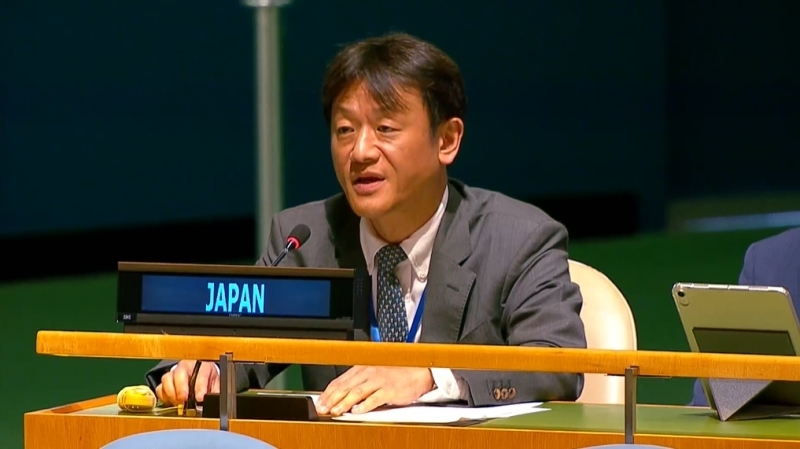安保理改革に関する政府間交渉(IGN)ロールオーバーに係る国連総会決定に関する入谷公使ステートメント
令和7年8月26日

(As delivered)
Mr. President,
I deliver this statement on behalf of the G4 – Brazil, Germany, India, and my own country, Japan.
In light of the continued and serious challenges to international peace and security and the critical role of the Security Council in addressing them, reform of the Council is urgently needed and must be advanced without delay, as was also underscored in the Pact for the Future.
In this regard, the G4 welcomes this year’s discussions under the IGN on the revised Liechtenstein model and the CARICOM model. The G4 extends its appreciation to the IGN Chair and his entire team for their dedication, coordination, and facilitation to advance the IGN process.
We also thank the IGN Chair for the “Revised Co-Chairs’ Elements Paper”. The G4 recalls that the document is solely the responsibility and authorship of the Chair and does not consist of language agreed upon at the intergovernmental level.
In this context, the G4 expresses two specific and serious concerns among others. The first is that the document fails to mention the majority support for an expansion of both the permanent and non-permanent categories. The second is that it characterizes the IGN as the exclusive platform to lead discussions on Security Council reform. Such a claim, with which we firmly disagree, finds no basis in any document adopted at the IGN or elsewhere.
Mr. President,
Despite the progress in the discussions on the models, it must be noted that the current session of the IGN has not yielded any substantial outcomes and has not met the widespread expectations for Security Council reform.
In this regard, it is crucial that the forthcoming session generates tangible progress that leads to text-based negotiations with clearly specified timelines, akin to the approach followed in other negotiations in the UN. The usefulness and suitability of the IGN will be inevitably assessed by the progress achieved.
Mr. President,
The continued failure in Security Council reform is an issue that goes well beyond the Council itself. Given the reality that trust in the United Nations, which is at the center of multilateralism, has been shaken and the international order is in flux, reform of the Council is needed not only to strengthen the UN as a whole, but also to maintain the entire international order. The G4 would, therefore, like to emphasize that this is an urgent issue that deeply concerns all Member States, not just a few.
The upcoming session is a particularly important milestone, as it will commemorate the 80th anniversary of the founding of the UN. We must not miss this opportunity. The G4 strongly hopes to move the reform forward with the serious involvement of all Member States to redesign the Security Council from its current structure, a snapshot of the international environment in 1945, into one that accurately reflects the contemporary realities. It is with this hope and positive spirit that we approach the rollover decision.
I thank you.
I deliver this statement on behalf of the G4 – Brazil, Germany, India, and my own country, Japan.
In light of the continued and serious challenges to international peace and security and the critical role of the Security Council in addressing them, reform of the Council is urgently needed and must be advanced without delay, as was also underscored in the Pact for the Future.
In this regard, the G4 welcomes this year’s discussions under the IGN on the revised Liechtenstein model and the CARICOM model. The G4 extends its appreciation to the IGN Chair and his entire team for their dedication, coordination, and facilitation to advance the IGN process.
We also thank the IGN Chair for the “Revised Co-Chairs’ Elements Paper”. The G4 recalls that the document is solely the responsibility and authorship of the Chair and does not consist of language agreed upon at the intergovernmental level.
In this context, the G4 expresses two specific and serious concerns among others. The first is that the document fails to mention the majority support for an expansion of both the permanent and non-permanent categories. The second is that it characterizes the IGN as the exclusive platform to lead discussions on Security Council reform. Such a claim, with which we firmly disagree, finds no basis in any document adopted at the IGN or elsewhere.
Mr. President,
Despite the progress in the discussions on the models, it must be noted that the current session of the IGN has not yielded any substantial outcomes and has not met the widespread expectations for Security Council reform.
In this regard, it is crucial that the forthcoming session generates tangible progress that leads to text-based negotiations with clearly specified timelines, akin to the approach followed in other negotiations in the UN. The usefulness and suitability of the IGN will be inevitably assessed by the progress achieved.
Mr. President,
The continued failure in Security Council reform is an issue that goes well beyond the Council itself. Given the reality that trust in the United Nations, which is at the center of multilateralism, has been shaken and the international order is in flux, reform of the Council is needed not only to strengthen the UN as a whole, but also to maintain the entire international order. The G4 would, therefore, like to emphasize that this is an urgent issue that deeply concerns all Member States, not just a few.
The upcoming session is a particularly important milestone, as it will commemorate the 80th anniversary of the founding of the UN. We must not miss this opportunity. The G4 strongly hopes to move the reform forward with the serious involvement of all Member States to redesign the Security Council from its current structure, a snapshot of the international environment in 1945, into one that accurately reflects the contemporary realities. It is with this hope and positive spirit that we approach the rollover decision.
I thank you.
